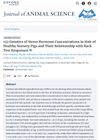1 citations,
December 2021 in “American Journal of Obstetrics and Gynecology” Hair cortisol levels peak in the third trimester and decline postpartum.
 February 2024 in “Psychoneuroendocrinology”
February 2024 in “Psychoneuroendocrinology” Mothers with lower stress during pregnancy but higher stress after birth had infants with lower development scores.
 May 2023 in “General and comparative endocrinology”
May 2023 in “General and comparative endocrinology” Monkey hair cortisol levels are not affected by how fast their hair grows.
May 2022 in “Hormones and behavior” Prairie dogs with fewer neighbors are more stressed but their number of babies isn't affected.
43 citations,
October 2005 in “Molecular and cellular endocrinology” Hair melanocytes help the skin respond to stress and regulate hair pigmentation.
 6 citations,
May 2022 in “Frontiers in Medicine”
6 citations,
May 2022 in “Frontiers in Medicine” The study suggests pandemic stress might worsen or trigger hair loss problems.
 5 citations,
April 2022 in “Journal of Chromatography B”
5 citations,
April 2022 in “Journal of Chromatography B” The new method can measure sleep-related hormones in hair effectively and could help track long-term sleep patterns.
 5 citations,
September 2021 in “Cureus”
5 citations,
September 2021 in “Cureus” Depression in women with Polycystic Ovarian Syndrome (PCOS) is linked to insulin resistance and hyperandrogenism, and managing these can help reduce depression. Lifestyle changes and Cognitive Behavioral Therapy can be effective treatments.
 September 2024 in “Journal of Cosmetic Dermatology”
September 2024 in “Journal of Cosmetic Dermatology” Ectoin helps prevent cortisone-induced skin problems and supports skin health.
14 citations,
December 2021 in “International journal of molecular sciences” Growth hormone levels affect hair growth and loss, with too much causing excess hair and too little leading to hair loss.
August 2022 in “Metabolic Brain Disease” Ferulic acid may help control menstrual cycle-related epilepsy by affecting female hormones.
 15 citations,
July 2017 in “Hormones”
15 citations,
July 2017 in “Hormones” Genetic defects in the glucocorticoid receptor gene can cause conditions with abnormal sensitivity to stress hormones, and other factors may also affect this sensitivity.
 15 citations,
April 2016 in “Hormones”
15 citations,
April 2016 in “Hormones” Mutations in the NR3C1 gene cause a rare condition that affects hormone signaling and can lead to various symptoms, with dexamethasone as a treatment option.
 9 citations,
January 2017 in “International Journal of Trichology”
9 citations,
January 2017 in “International Journal of Trichology” The study suggests that mast cells might be involved in the hair loss condition telogen effluvium and could be a target for treatment.
5 citations,
January 2021 in “PeerJ” Elephant tail-hair can show past stress levels, matching times when stressful events happened.
 2 citations,
October 2022 in “Journal of Biomedical Science”
2 citations,
October 2022 in “Journal of Biomedical Science” Stem cells and their secretions could potentially treat stress-induced hair loss, but more human trials are needed.
 1 citations,
November 2023 in “Brain and behavior”
1 citations,
November 2023 in “Brain and behavior” Spironolactone improved cognitive performance and early sleep quality but not manic symptoms, appetite, or body weight in bipolar disorder when added to sodium valproate.
July 2024 in “Behavioural Brain Research” Long-term finasteride treatment reduces depression and brain issues in obese male rats.
 November 2023 in “Journal of animal science/Journal of animal science ... and ASAS reference compendium”
November 2023 in “Journal of animal science/Journal of animal science ... and ASAS reference compendium” Pig hair cortisol levels are inheritable and linked to stress responses, which could help select for more resilient pigs.
 January 2022 in “Journal of family medicine”
January 2022 in “Journal of family medicine” Polycystic Ovarian Syndrome (PCOS) can cause chronic inflammation, mental health issues, and changes in gut bacteria, but a holistic lifestyle change can significantly improve these conditions.
 January 2019 in “Obstetrics & Gynecology International Journal”
January 2019 in “Obstetrics & Gynecology International Journal” Hormonal changes and conditions like polycystic ovarian syndrome are major causes of adult acne in women, with varying prevalence among different ethnicities.
January 2019 in “Frontiers in neurology” A nutrition program improved a young woman's concussion symptoms.
16 citations,
January 2021 in “Frontiers in veterinary science” Pigs in farrowing crates and loose-housing systems showed no difference in chronic stress levels as measured by hair cortisol.
8 citations,
January 2016 in “Cells tissues organs” Norepinephrine helps skin cells grow, which is important for hair growth.
3 citations,
November 2021 in “Stress” Girls had higher stress hormone levels during school due to social and emotional issues, while boys had higher overall hormone levels with slight changes when school started.
 August 2024 in “Applied Sciences”
August 2024 in “Applied Sciences” Plant extracts may help prevent or reverse hair graying.
 February 2024 in “Biomedicines”
February 2024 in “Biomedicines” Hormones like androgens, estrogen, thyroid hormones, and stress hormones can contribute to hair loss, and treatments target these hormonal imbalances.
134 citations,
July 2020 in “Experimental dermatology” Hair follicles are normally protected from the immune system, but when this protection fails, it can cause hair loss in alopecia areata.
106 citations,
January 2013 in “Clinical and Developmental Immunology” Alopecia areata is caused by immune system attacks on hair follicles, often triggered by viral infections.
102 citations,
July 2020 in “International journal of molecular sciences” Hormones like testosterone and estrogen significantly affect hair growth and structure.















